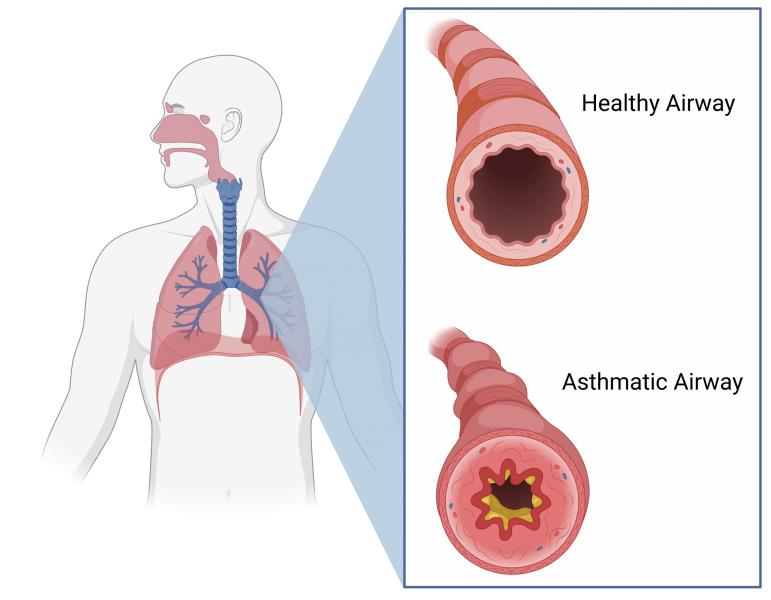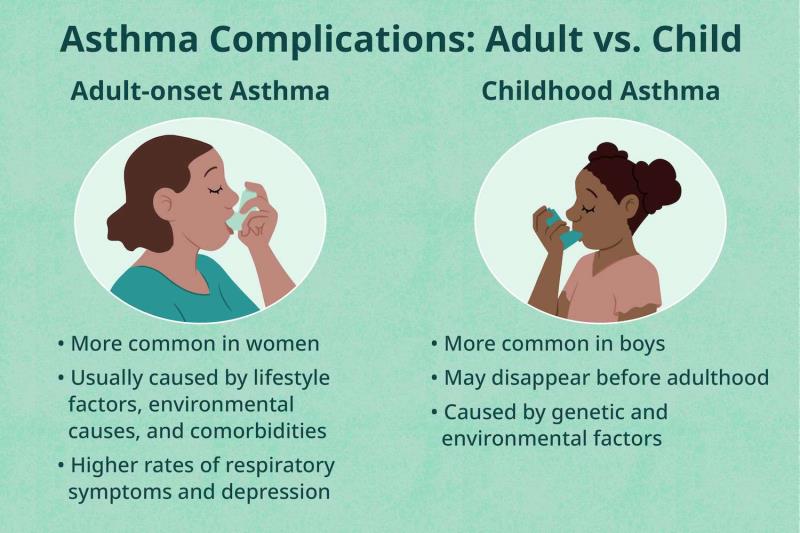Asthma is a condition that affects your airways – the small tubes that carry air in and out of the lungs.
The more you know about the causes, symptoms and types of asthma there are, the easier it will be to manage it well with your doctor’s support.

What is asthma?
Respiratory Physiotherapist Sonia explains how asthma affects the airways with step-by-step whiteboard drawings. See the link below.
https://youtu.be/4YdydaDsRyw
Asthma is a long-term condition that affects your airways – the tubes that carry air in and out of your lungs.
It usually causes symptoms such as coughing, wheezing and breathlessness.
If you come into contact with one of your asthma triggers, it can make your symptoms worse and even bring on an asthma attack.

What is an asthma action plan?
Everyone with asthma can benefit from using an asthma action plan.
It tells you, and anyone with you:
- which medicines you take every day to prevent symptoms and cut your risk of an asthma attack
- what to do if your asthma symptoms are getting worse
- the emergency action to take if you’re having an asthma attack and when to call 999.
You fill it in with your GP or asthma nurse, so it’s personal to you and your asthma.
Then take it along to all your asthma appointments, including any out of hours appointments or A&E, so your doctor or asthma nurse can help you keep it up to date.
“Experts recommend asthma action plans to look after your asthma well and cut your risk of an asthma attack,” says Dr Andy Whittamore, Asthma UK’s in-house GP.
“If your GP or asthma nurse hasn’t offered you an asthma action plan, don’t be afraid to ask them for one. Show them the one you’ve downloaded here and ask them to help you fill it in.”
Download your Asthma Action Plan here.
asthma-action-plan-adult-2021.pdf
How do my airways react to triggers?
If you have asthma you have ‘sensitive’ airways that are inflamed and ready to react when they come into contact with something they don't like.
If you come into contact with one of your asthma triggers it causes your airways to react in three ways:
- The muscles around the walls of the airways tighten so that the airways become narrower.
- The lining of the airways becomes inflamed and starts to swell.
- Sticky mucus or phlegm sometimes builds up, which can narrow the airways even more.
These reactions in the airways make it difficult to breathe and lead to asthma symptoms, such as chest tightness, wheezing, or coughing. It can also lead to an asthma attack.
Who gets asthma?
In the UK, around 5.4 million people are currently receiving treatment for asthma. That's one in every 12 adults and one in every 11 children.
Asthma affects more boys than girls. Asthma in adults is more common in women than men.
It tends to run in families, especially when there's also a history of allergies and/or smoking.

Is asthma the same for everyone?
Everyone with asthma has their own personal set of triggers and symptoms. Using a written asthma action plan is the best way to keep a record of your individual treatment plan.
You can have a certain ‘type’ of asthma too. For example, occupational asthma is caused by triggers in your workplace. Around 4% of people with asthma have a type of asthma called severe asthma, which needs specialist treatment because the usual medicines don’t keep symptoms under control.
Will I always have asthma?
Asthma is a lifelong condition; most people who have asthma will always have asthma.
But if you’ve been diagnosed with asthma as a child, your asthma might improve or disappear completely as you get older, particularly if the asthma was mild.
Even if asthma goes away it can come back later in life, perhaps because you’ve come into contact with new triggers in your job, or you’ve moved to an area with more air pollution for example. Hormonal changes such as pregnancy and menopause can also bring it on again.
But the good news is that even though asthma doesn’t go away there are lots of safe and effective treatments available to help you stay symptom-free.
If you’ve tried taking all the usual treatments in the right way, but you’re still having symptoms, your GP can refer you to a specialist to see if you have severe asthma. This kind of asthma only affects around 4% of all people with asthma. An asthma specialist can help you find the right treatments for you, for example monoclonal antibodies.
Can asthma get worse at different times in my life?
There are certain stages in your life that might affect your asthma. For example, some women find that being pregnant can make asthma either better or worse and hormonal changes, at puberty, menopause or during the menstrual cycle might have an impact too.
There are lots of other life changes that might temporarily affect your asthma symptoms. Stress, for example, whether from a relationship breakdown or family illness, can make symptoms worse.
Having frequent asthma attacks can also make asthma worse over time. Asthma attacks can cause scarring in your airways which makes them narrower. This is sometimes called ‘airway remodelling’.
If your airways are scarred and narrow, you’re more likely to have worse symptoms more often.

How can I stop my asthma getting worse over time?
The best way to stop your asthma getting worse over time is to stick to a good routine of taking your preventer medicines as prescribed.
And if you notice your symptoms are getting worse, see your GP or asthma nurse as soon as possible so they can review your treatment.
You can also cut your risk of frequent asthma attacks, and your asthma getting worse, by stopping smoking.
Having an asthma review at least once a year, gives you a chance to talk through any symptoms or new triggers. You can check you’re on the right medicine and that you’re using your inhaler in the right way to get the most benefits.
You can also talk to your GP or asthma nurse about whether you need a higher dose or an ‘add-on’ treatment to help with symptoms.
The link below has some handy videos on how to use your inhalers.
How to use your inhaler | Asthma UK
How serious is asthma?
Tragically, three people die every day because of asthma attacks and research shows that two thirds of asthma deaths are preventable.
The reassuring fact is that most people with asthma who get the right treatment - and take it correctly - can manage their symptoms and get on with what they want to do in life.
Can asthma be cured?
Here at Asthma UK we're striving to find a cure, but currently there is no cure for asthma.
The good news, though, is that there are lots of safe and effective treatments available to manage the symptoms.
You just need to work with your GP or asthma nurse to find the ones that work well for you, and get into good habits so you take them exactly as prescribed, so you can get the benefits.
The information above has been quoted from the Asthma UK website.
For patients who are due an annual asthma review.
Please would you answer the questions on the form below and submit it to us.
If your symptoms are deteriorating or you have any concerns, please make an appointment to the respiratory nurse or a doctor as well.
Open the Asthma Annual Review Form